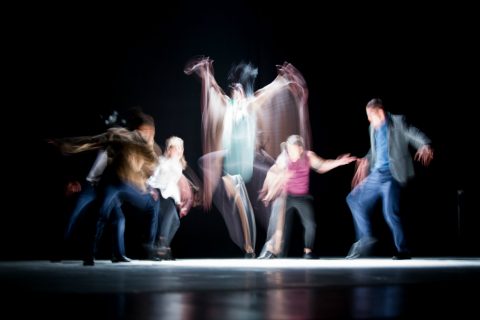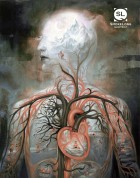For such brief prose, this story is as once intimate and hugely resonant. How did you conceive of “Gathered Family” as a piece of flash?
I wrote this piece with a beginning and ending in mind and no conception of how long the middle would be. As I was writing, I felt like I could say what I wanted to through a collection of moments and memories filling it out. I think the story is grounded in those smaller details—of what it’s like when a family gets together and how there can be this intimacy without even knowing each other’s names—but it also speaks to something larger, the journeys we make to get here and the unspoken bonds that connect us. The idea of home is both immediate and vast, which is what I was trying to get at in this piece.
I enjoy the concept of the interloper in this story—Carl is an outsider at this familial junction, but the narrator’s family members might be read this way as well—and the contrast of reader as interloper versus reader as implicated character. What led to writing this story in the second person?
I used second person in this piece to bring the reader into the story, to close the distance between outside and inside and make the reader feel as if they’re part of the family gathering, another character in the story. I wanted to create a sense of closeness, mirroring the subject and settings of the story, and I liked the idea of pulling the reader right into it and having them travel through space and memories with the narrator. I wanted to invite the reader in, to allow this experience to become their own rather than that of some distant person, and to have that experience be one that is full of urgency and sensory details and emotion.
I find myself clinging to the buildup of this story’s end and the long, momentous sentence that concludes it. When writing, how do you know when and how to end a story?
I kept adding to that last sentence until I felt satisfied. I think that’s how I treat endings in general—I don’t have an exact idea planned out, but I have a feeling that I want to end on and that I want the reader to be left with. And it’s just about writing until the point that I can get to that feeling, until the feeling translates onto the page.
How does “Gathered Family” speak to your own personal and writerly questions, concerns, and obsessions?
I write often about migration and identity and place and displacement and the idea of home and family, whether inherited or chosen. I write stories that center my people, and I write what feels both important and close to me. I’m interested in the idea of heritage, how we each carry these stories/places/times/memories/people that shape the way we experience the world. I was exploring these ideas as I wrote “Gathered Family”—how all these individuals with their own experiences and identities can come together and still have something greater binding them, the power of the collective. Beneath these themes, I think I’m always writing about empathy, about these small humanizing moments or the ways that big changes and events play out in everyday relationships. I guess you could say I’m obsessed with the minute, the little details and nuances that can take something distant and make it personal. Even the smallest details can hold so much significance.
Lately, I’ve been writing in this kind of vignette form, pulling together small moments, observations, or words that work together to say something larger. It’s not really a conscious choice, just something that’s been showing up in my writing again and again.
What are you working on now, either in terms of writing or other forms of expression?
I don’t regularly write flash fiction, but sometimes I sit down to write and that’s what comes out. I’m actually working on something very different to flash right now—a novel. It’s a long, long process that’s pulling me deep into the world of research and family history, but I love the process of working on a big project that feels both personal and important for me to write. It can be a challenge to keep working at it, though, which is probably why I write smaller pieces at the same time. I’m working on some essays around food and diaspora and some shorter fiction. And I’ll most likely find myself back writing more flash, because it’s very satisfying to write a whole draft of something in one sitting.



 The SmokeLong Grand Micro Contest (The Mikey) is now an annual competition celebrating and compensating the best micro fiction and nonfiction online.
The SmokeLong Grand Micro Contest (The Mikey) is now an annual competition celebrating and compensating the best micro fiction and nonfiction online.